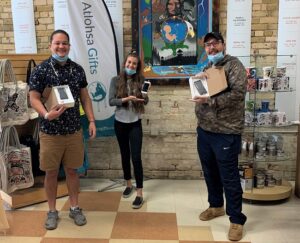Rogers Communications and Atlohsa Healing Services work together to keep families connected

By Colin Graf
LONDON, ON— First Nations people living in London, Ont., are getting new opportunities to stay in touch with family, friends, and needed services thanks to Atlohsa Healing Services and a donation of 75 cellphones from Rogers Communications.
“Rogers has offered the phones to Atlohsa primarily for women who are experiencing violence in the community or are staying in the agency’s shelter,” says executive director Raymond Deleary in a recent phone interview. “Now phones are being offered to a wider variety of community members in need.”
Deleary explains that having a phone will help ensure members are connected to Atlohsa and other services so that they can contact somebody if they need assistance, or just to talk to someone for support during the coronavirus disease 2019 (COVID-19) pandemic.
“Life has been very hard for marginalized First Nations people in a city such as London; isolated during a pandemic without the devices that so many people use daily and take for granted,” he says.
At the beginning of the pandemic, Atlohsa, like many social services, “just went dark” Deleary recalls, and describes how his staff had to figure out new and creative ways to continue counselling and other forms of support to clients. He explains that these new ways have been technology-based and while Atlohsa has been providing one-on-one counselling and group sessions via the internet since April, a segment of their community has been left out.
“All that‘s great for people who have devices, but those who don’t are harder to reach.”
During the pandemic, some of these people have called Atlohsa from payphones, which Deleary recognizes are getting rarer and harder to find all the time.
“When these people get in touch now, staff are quick to tell them, ‘Hey, we have these devices and you’re welcome to one’,” he relates.
Many community members are “vulnerable on top of vulnerable,” and “in many cases, in a state of crisis,” he notes, adding that they may have a device of their own, but “it can become increasingly difficult to sustain that service” for those with very limited income.
“This helps to ease some of that struggle.”
He believes that the new phones are making a difference already. About half have been distributed so far, and Deleary expects the others will be gone soon. When he recently saw an elderly woman client on the street, she waved him down to tell him excitedly that the new device had given her a chance to tell her family she was moving from transitional housing into long-term stable housing.
“She said, ‘I’m so excited. My family has always worried about me because I didn’t have a cell phone and they didn’t know how to get in touch with me and I couldn’t access Facebook, so this has just been so great,’” Deleary relates. “[A phone] not only provides a means of communication with service providers but even just having a network of support of extended family and friends is crucial right now when all we hear is about social distancing and keeping apart.”
Rogers “is committed to finding ways to help provide an essential digital lifeline and critical supports for residents in Southwestern Ontario who need it the most,” said Philippe Oille, President of Southwestern Ontario Region, Rogers Communications, in a news release. “Whether calling emergency services, accessing support, or staying in touch with loved ones, the donations are aimed at helping vulnerable women with their immediate and crisis needs.”
According to the news release, Rogers is providing six months of free voice and data plans along with the devices for organizations across southwestern Ontario.
Deleary explains that many Canadians do not understand that Indigenous communities are already isolated even without the pandemic rules everyone has been living with.
“They are a marginalized population, already vulnerable— not everybody— but the majority are battling with poverty, homelessness, and other issues like that,” Deleary says. “So you throw a pandemic on top of all that and it adds just that much more stress to someone’s daily survival.”
He says some clients would use public access internet in places such as libraries to stay connected, but those were quickly shut by lockdown rules.
Atlohsa staff have been reaching out in other ways to help their community members, Deleary says, noting that they have been able to give out gift cards for groceries and outreach workers have also been checking in on clients right at their doorstep.
“It won’t take long to distribute the other phones,” he says. “Word of mouth travels fast in our community.”
He adds that many people show up at the Atlohsa offices on Richmond Street in the heart of London’s downtown.
“Many have such large extended families they are able to pass word on,” he says.


